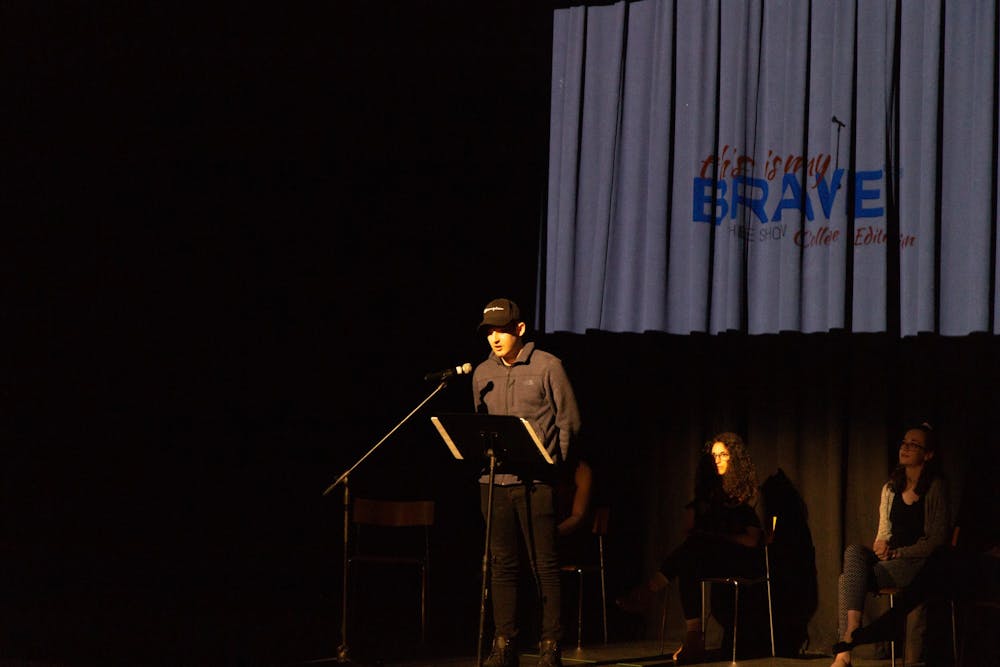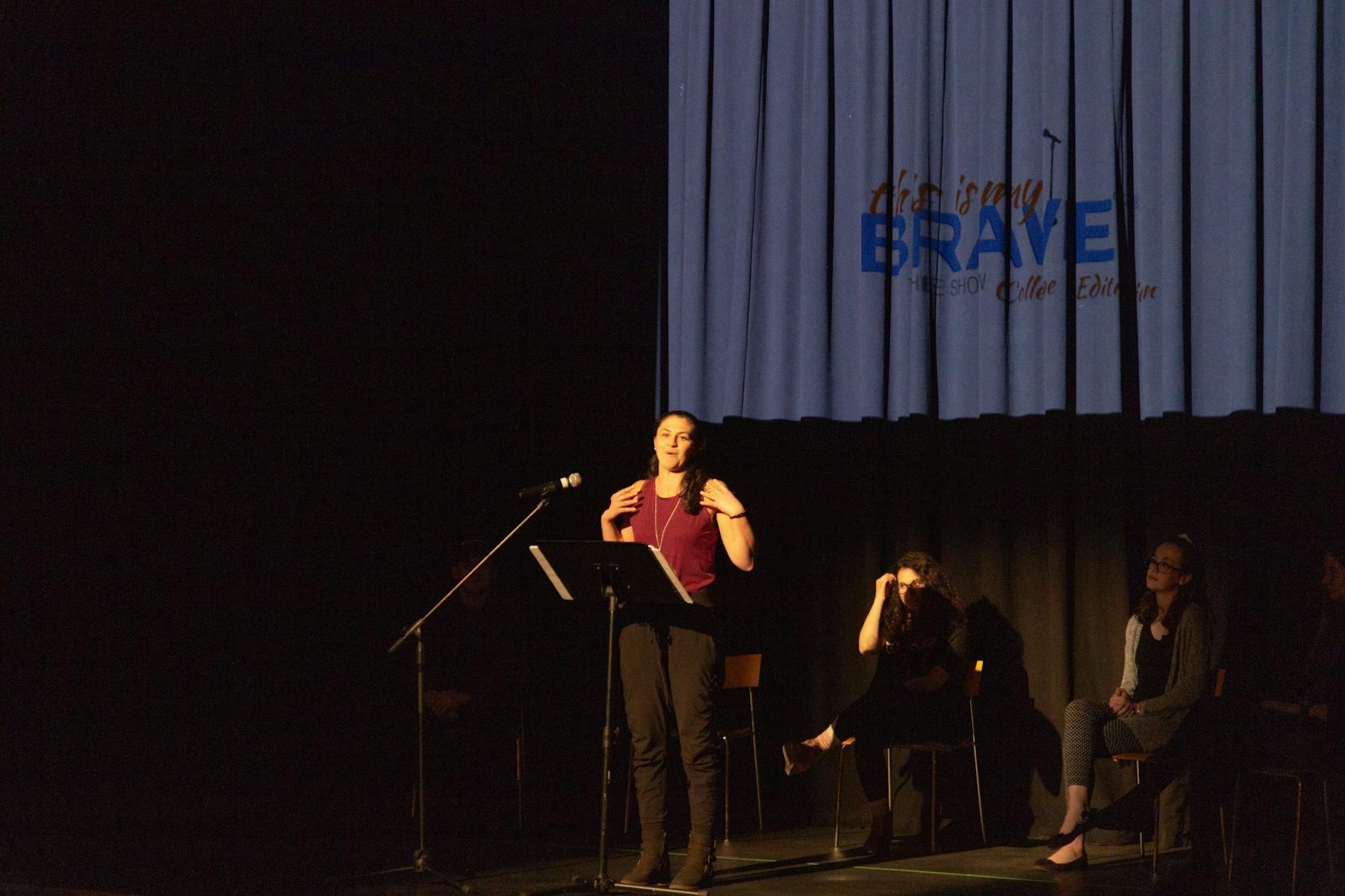"This Is My Brave—College Edition" performs at Brandeis

The cast of “This Is My Brave — College Edition” shared their experiences with mental illness with the Brandeis community in the form of poems and interactive stories last Thursday in the Shapiro Campus Center. The event aimed to “create a positive and supportive conversation around mental health through students sharing their personal stories using creative expression,” per the University’s website.
This Is My Brave began as a blog in August 2011 when Jennifer Marshall, a mother of two young kids, shared her experience with bipolar disorder. In October 2013, Marshall partnered with Anne Marie Ames to design and produce a theater show that would decrease the stigma associated with mental health. Since then, This Is My Brave has “produced over 50 unique shows in cities across the United States featuring over 700 storytellers,” per their website In 2019, Marshall and Ames decided to create two new pilot programs aimed at educating young adults and teenagers about mental health and stigma. As part of the initiative, they recruited a team of 10 graduate and undergraduate students from Boston-area campuses that performed at Lesley University, Harvard University, Northeastern University, Tufts University and Boston University prior to coming to Brandeis. Four of those students — Josh Ludwig, Ally Beard, Ali Gold and Mallory Gothelf — and one of the co-producers of the “This Is My Brave — College Edition,”Audrey Grubb, performed, sharing their experiences with Brandeis students, faculty, staff and Waltham residents.
Using humor, sadness, irony and nostalgia, the four students highlighted the importance of speaking up about issues surrounding mental health and establishing a strong support network. As Gothelf stated in an interview with the Justice, “Whatever you are going through it never helps to keep that inside or internalize it.” One of the first steps people should “always take” is sharing those feelings with someone, whether it is a friend, family member or counselor, according to Gothelf. “I think that is when you can receive a lot of support and really bolster what you are going through,” she explained. With one out of five Americans impacted by a mental illness every year, communication is the only way to decrease the stigma that currently exists around these topics and provide help to those who need it, the cast reminded the audience.
Several narratives also emphasized the importance of self-care in maintaining physical and mental health. Beard, a junior at Harvard University who shared her journey in dealing with anxiety and depression, told the Justice that “no matter how busy you are, it is important to take time for yourself every single day. … It’s going to help you to feel better, to work better and to be better.” While prioritizing self-care might be difficult in college, especially during particularly busy weeks, doing so will “make you more efficient in the long run,” she added. It is important to remember, the performers said, that self-care looks different for everyone. As Grubb mentioned in an email to the Justice, “Self-care doesn’t always have to be a day at the spa. It can be as simple as taking a few deep breaths in the middle of the day to reset before class, listening to music, or taking a quick walk. Find something that works for you and DO IT.”
All of the stories shared by the cast also explored the role of their families in their road to recovery from mental illness. While the performers expressed gratitude toward their family members for being supportive and proactive, it is worth recognizing that this is not a universal experience and that cultural differences might make it hard for certain individuals to ask for help, receive assistance and access treatment. As Gothelf mentioned, “It can be hard because your family plays such a huge role and culturally there are aspects that people are not going to agree with or understand.” Beard added to that, stating that her “family was not actively against mental health or mental well-being, but they just did not know what anxiety was.” Naivety and lack of awareness are, indeed, common among older generations who were simply never exposed to these subjects because of the taboos associated with them. Dealing with inexperienced parents can be taxing, especially during periods of stress. Beard advises individuals going through this to “try to have patience… no matter how frustrating it might be.” Gothelf emphasized the importance of taking the time and space to consider the best ways to approach and discuss the subject, “whether that be by distancing yourself a little bit so you can take time to heal and feel strong” or by reaching out to others who might understand. She added that “sometimes you just have to create a little distance so can take care of yourself.”

The event, which was sponsored by the Dean of Students Office and the Health and Wellness Program, was followed by a reception that featured food and drinks and allowed the audience to talk directly with the cast. This Is My Brave is still seeking undergraduate and graduate students interested in sharing their stories about mental health. While platforms like This Is My Brave provide individuals with a great opportunity to share their journey with mental health, Grub urges people to remember that “everyone experiences mental health and recovery differently,” and that as long as you are receiving help, the way you choose to share — or not share — your story is completely valid.
If you need to talk to someone immediately, please call one of the following resources:
Brandeis Counseling Center after hours: 781-736-3785
Brandeis 6TALK: 781-736-8255
National Suicide Prevention Lifeline: 800-273-8255
Self-harm Hotline: 800-273-TALK



Please note All comments are eligible for publication in The Justice.